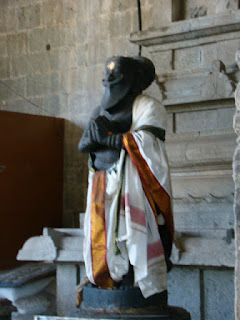Ekämbareçwara, Kanchipuram
Çré
Ekämbareçwara Temple is one of the Panchabhüta Sthalas (signifying five
elements – space, air, fire, water, and earth). Lord Çiva is worshipped here in
the form of Påthivé (earth) Liìgam. Hence, Kanchipuram is considered as one of
the Panchabhüta Sthalas.
Period & Builder
The
Pallavas and the Cholas had contributed to the upkeep of this Temple. The
Pallavas had pulled down the then existing structure, and rebuilt it. The
present structure however, owes its existence to the Vijayanagara Kings.
Temple architecture/style/specialty
The
Ekämbareçwara Temple is Kanchipuram’s largest Temple and most important Çiva
shrine. It is also known as Ekämbranath, and is easily identifiable by its
colossal white-washed Räjagopuram. The towering Räjagopuram can be seen miles
away from Kanchi (I photographed it from far). It rises to a height of 194 feet,
thus the 3rd tallest Gopuram { i) Sri Rangam 240-feet, ii) Tiruvannamalai
217-feet, iii) Ekambareswara 194-feet, iv) 11-tiered Srivilliputhur 192-feet v)
Southern Rajagopuram of Madurai
160-feet vi) Eastern Rajagopuram of
Madurai 153-feet, vii) 12-tiered Rajagopuram of Sarangapani 146-feet, viii)
Suchindram 134-feet} and was built by the great Vijayanagar Emperor Sri
Krshnadeva Raya in 1509 CE, the first year of his rule.
The
Räyas were great benefactors of this 40-acre Temple, building its towering gopuras, long corridors, and maëòapams, including pillared hall in
front of the sanctum.
The
entrance, through a high arched passageway beneath an elaborate gopura in the south wall, leads to an
open courtyard and a majestic ‘Thousand-Pillared Hall’ - Kalyäëa Maëòapam, whose slightly decaying grey
stone columns are modeled as nubile maidens, animals, and deities.
In
the courtyard is a venerable mango tree under which Çiva and Kämäkñé were
married. This union is celebrated during a festival each April, when many
couples are married in the Kalyäëa Maëòapam.
Many ancient
classics, including Maëimekalai refer
about this temple. It finds mention in the hymns of saints Appar, Sambandar and
Sundarar.
Legend
Siva,
worshipped here in his form as Kämeçwara – ‘the Lord of Desire’. Legend
connects it with the goddess Kämäkñé (having eyes of desire), Çiva’s consort,
who angered Çiva by playfully covering his eyes, and plunging the world into
darkness. Çiva reprimanded her by sending her to make a liìgam from the earth
in his honour. Once it was completed, Kämäkñé found that she could not move it.
Famous Gopurams
|
Tier
|
Height
|
Builder
|
||
1
|
Sri Ranganathaswamy Temple
|
Trichy
|
240 feet
|
1980
|
|
2
|
Arunachaleswara Temple
|
Tiruvannamalai
|
217 feet
|
||
3
|
Ekambareswara
Temple
|
Kanchipuram
|
194
feet
|
||
4
|
Sri Andal Temple
|
Srivilliputhur
|
11-tier
|
192 feet
|
|
5
|
Southern Rajagopuram
of Minakshi
|
Madurai
|
9-tier
-1511 sculptures
|
160
feet
|
Sevvanti Murty Chettiar in 1559 CE
|
6
|
Eastern Rajagopuram
of Minakshi
|
Madurai
|
153 feet
|
Maravarman
Sundara Pandyan
|
|
7
|
Sarangapani Temple
|
Kumbakonam
|
12 tier
|
146 feet
|
|
8
|
Suchindram
|
Kanyakumari
|
134 feet
|
||
9
|
Rameswaram
|
Rameswaram
|
126 feet
|
***






